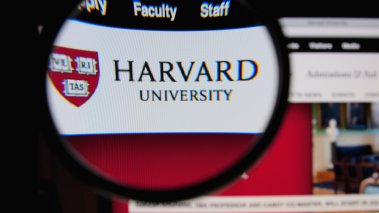Table of Contents
Harvard gets worst score ever in FIRE’s College Free Speech Rankings

Gil C / Shutterstock.com
Harvard is consistently ranked one of the best universities in the United States. But FIRE frequently finds itself in the odd position of giving this all-star academic school failing grades.
Simply put, Harvard has never performed well in FIRE’s College Free Speech Rankings, finishing below 75% of the schools surveyed in each of the past four years.
In 2020, Harvard ranked 46 out of 55 schools. In 2021, it ranked 130 out of 154 schools. Last year, it ranked 170 out of 203 schools. And this year, Harvard completed its downward spiral in dramatic fashion, coming in dead last with the worst score ever: 0.00 out of a possible 100.00. This earns it the notorious distinction of being the only school ranked this year with an “Abysmal” speech climate.
What’s more, granting Harvard a score of 0.00 is generous. Its actual score is -10.69, more than six standard deviations below the average and more than two standard deviations below the second-to-last school in the rankings, its Ivy League counterpart, the University of Pennsylvania. (Penn obtained an overall score of 11.13.)
This raises the question: Why did Harvard do so poorly? In light of its historically low ranking, the reasons are many.
Bad across the board
First of all, Harvard, which on paper commits to protecting free speech, has a dismal record of responding to deplatforming attempts — attempts to sanction students, student groups, scholars, and speakers for speech protected under First Amendment standards. Of nine attempts in total over the past five years, seven resulted in sanction.
For each of these seven incidents, Harvard was penalized in the rankings:
- From 2019 to this year, Harvard sanctioned four scholars, three of whom it terminated.
- In 2020, Harvard revoked conservative student activist Kyle Kashuv’s acceptance over comments he made on social media as a 16-year-old, for which he had since apologized.
- In 2022, Harvard disinvited feminist philosopher Devin Buckley from an English department colloquium on campus over her views on gender and trans issues.
- In 2019, Harvard was the site of a substantial event disruption when protesters interrupted a joint talk featuring former Harvard President Lawrence S. Bacow and Graduate School of Education Dean Bridget Terry Long by occupying the stage and refusing to leave.
Harvard also performed very poorly on a number of the survey-based components of the College Free Speech Rankings, ranking 193 out of 254 on “Comfort Expressing Ideas,” 183 on “Administrative Support,” and 198 on “Disruptive Conduct.” This is reflected in student survey responses. For instance, just over a quarter of Harvard students reported they are comfortable publicly disagreeing with their professor on a controversial political topic; only roughly a third think it is “very” or “extremely” clear the administration protects free speech on campus; and an alarming 30% think using violence to stop a campus speech is at least “rarely” acceptable, an increase from the 26% of Harvard students who felt this way last year.
Only time will tell if Harvard can climb out of the hole it has dug for itself over the past five years. But one thing’s for sure: it must start with promoting free expression on campus, making room for more speech, not less.
Trends over the last four years of Harvard’s data are troubling as well. For starters, self-censorship is steadily on the rise, with the percentage of Harvard students who say they self-censor on campus “fairly often” or “very often” increasing from 16% two years ago to 22% last year and 24% this year.
Over the past four years, abortion in particular has become increasingly difficult to discuss on campus, perhaps due to its increasing prominence in the public conversation following the overturning of Roe v. Wade. In 2020, 35% of Harvard students identified abortion as “a difficult topic to have an open and honest conversation about on campus.” This percentage dipped to 29% the following year, then increased to 39% last year and to 46% this year.
Last but not least, Harvard’s speech policies leave a lot to be desired. The school earns FIRE’s “yellow light” rating, indicating that it maintains policies that restrict some amount of protected expression or that, by virtue of their vague wording, Harvard could too easily use to restrict protected expression. For instance, Harvard requires students to be “civil” when using computers and networks.
Solutions and silver linings
Harvard’s consistently poor performance over the past four years in FIRE’s College Free Speech Rankings reveals a serious problem at one of America’s most prestigious institutions.
Even in a hypothetical world in which every school FIRE surveyed earned a “green light” rating for its speech policies, Harvard would still come in dead last with a score of 4.31, and would trail the next school in the rankings by almost 22 points. This means Harvard cannot solve this problem by simply improving its speech code policies and paying lip service to supporting freedom of speech, academic freedom, and open inquiry on campus. It must consistently walk the walk by enforcing pro-speech policies as well as creating them, by refusing to cave to sanction attempts, and by changing the culture from one of self-censorship and fear to one of self-expression and courageous conversation.
One of the philosophical foundations of empirical science is that any idea, no matter how well-established as the “truth,” is still subject to challenge. In the past, many respected scholars have thought that it is “true” the world is flat, that humans and other primates do not share a common ancestor, and that stress causes ulcers. Each of the ideas has been refuted, but many of the refutations faced attempted suppression before eventually finding footing and becoming mainstream.
If this prestigious university hopes to turn things around, it should reflect on its traditional scholarly purpose and direct its attention toward reviving the free speech norms that make fulfilling that purpose possible.
This reveals that restrictions on free expression and academic freedom — whether by administrative fiat or social pressure — are as limiting as they are often ultimately futile. Stifling conversation only makes it more difficult to pursue truth. Harvard, of all places, should recognize this and refuse to stand for it. Its motto is “Veritas,” after all.
If this prestigious university hopes to turn things around, it should reflect on its traditional scholarly purpose and direct its attention toward reviving the free speech norms that make fulfilling that purpose possible. In doing so, it may build off of its relative success in the few categories of the rankings in which it scored highly.

NEW: 2024 College Free Speech Rankings show alarming 81% success rate of deplatforming attempts at nation’s most censorial schools
Press Release
Students entering college this fall can expect a culture of conformity and censorship according to a new FIRE survey of more than 55,000 students across the country shows that most attend colleges that don’t value free expression.
Harvard students, for example, ranked 59 on “Tolerance for Controversial Liberal Speakers” and 39 on “Tolerance for Controversial Conservative Speakers.” They also ranked 27 on “Mean Tolerance” (the average of tolerance for liberal and conservative speakers) and 97 on a measure of ideological favoritism, “Tolerance Difference” (the difference between tolerance for liberal speakers and tolerance for conservative speakers). To be clear, Harvard students are still more tolerant of controversial liberal speakers than of conservative ones, but compared to most of the other colleges surveyed, this favoritism is not particularly strong. Perhaps Harvard can capitalize on its students’ relatively similar levels of tolerance for liberal and conservative speakers by encouraging willing students to engage with viewpoints with which they disagree.
Further, while the percentage of Harvard students who reported finding the topic of abortion difficult to discuss on campus increased over the past few years, the percentage who support allowing a speaker on campus who previously expressed that “abortion should be completely illegal” increased from 47% in 2020 to 58% last year and this year. This indicates that a portion of Harvard students are open to hearing this view, perhaps believing such a speaker can spur the debate they feel is currently too difficult to have openly on campus.
Of course, even if such speakers do arrive on campus, the question remains: Would they face a deplatforming attempt? How would student organizers, or Harvard’s administration, react if they did? If Harvard did not disinvite the speaker, would they be able to successfully deliver their remarks? Given Harvard’s recent history, these are the questions its students, faculty, and administrators should be asking and proactively attempting to address.
Only time will tell if Harvard can climb out of the hole it has dug for itself over the past five years. But one thing’s for sure: it must start with promoting free expression on campus, making room for more speech, not less.
Recent Articles
FIRE’s award-winning Newsdesk covers the free speech news you need to stay informed.

Texas tramples First Amendment rights with police crackdown of pro-Palestinian protests

Here’s what students need to know about protesting on campus right now

Kansas takes a stand for intellectual freedom


